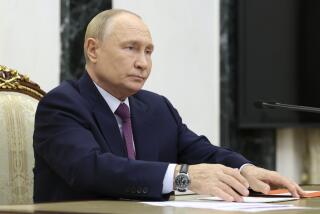Gorbachev Offers Conventional Arms Cuts
- Share via
MOSCOW — Soviet leader Mikhail S. Gorbachev said Tuesday he is ready to negotiate “deep reductions” in conventional arms and to declare a mutual moratorium with the United States on nuclear weapons tests.
Gorbachev made the statement in a nearly two-hour-long meeting in his Kremlin office with members of the International Physicians for the Prevention of Nuclear War. According to physicians who were present, Gorbachev seemed optimistic that a “good agreement” can be reached in the superpower arms control negotiations at Geneva that would ban intermediate-range nuclear missiles from Europe in the “foreseeable future.”
Gorbachev’s comment reflected remarks made in Geneva by Soviet negotiator Alexei A. Obukhov that the United States and Soviet negotiators have completed the first version of a joint draft on medium-range missiles.
It was the first time since the superpowers resumed arms control efforts in March, 1985, that the two sides have been working from a single, joint treaty document.
Obukhov said the work, completed Monday, was “an important step which paves the way for further progress.”
Much Work Remains
But he added at a news conference in the Swiss city that “much work remained to be done” in hammering out a final agreement.
Gorbachev said he would like to eliminate all nuclear weapons, and he specifically disputed the concept of nuclear deterrence, describing it as “dangerous and immoral.”
People who argue on behalf of nuclear deterrence, Gorbachev said, “haven’t learned the lessons of Hiroshima and Chernobyl”--a reference to the wartime bombing of Japan and last year’s nuclear disaster in the Soviet Union.
“Some people seem to want to forget about Chernobyl,” he said, “but we don’t want to forget. We will never forget.”
Gorbachev singled out British Prime Minister Margaret Thatcher as one who supports nuclear deterrence. She has referred to it with emphasis in her campaign for reelection next week.
Iceland Summit Discussions
According to the physicians, the Soviet leader recalled his meeting last year with President Reagan in Reykjavik, Iceland, and said he proposed to Reagan a plan to eliminate nuclear weapons by the year 2000.
“The United States replied that we should try for 1990,” Gorbachev was quoted as saying. “Of course, we said yes.”
He told the physicians that at Reykjavik, he had also proposed a nuclear test ban but that it had fallen on deaf ears.
“We tried to meet the U.S. halfway,” he said, “but they haven’t budged an inch.”
The remark was in apparent reference to the Soviet Union’s unilateral nuclear test moratorium, which remained in effect from August, 1985, until the United States detonated its first nuclear test of 1987, which occurred on Feb. 3. Gorbachev had urged the United States to join in the moratorium, but Washington refused, saying it needed to continue underground testing to maintain the capability of the West’s nuclear deterrent.
Dr. John Pastore, secretary of the physicians’ group and a professor at Tufts University, said that Gorbachev emphasized a desire to reduce conventional weapons as well as the nuclear arsenal.
“He said the Soviet Union is prepared to make deep cuts,” Pastore said.
But Gorbachev also underlined his opposition to Reagan’s Strategic Defense Initiative, the “Star Wars” program for a space-based missile defense system. If the nuclear arms race enters space, he told the doctors, arms control negotiations will bog down and a new spiral will begin in the arms race.
“Each country would be determined not to be undone,” he declared.
Dr. Bernard Lown, co-president of the association, which has about 140,000 members in 55 countries, said Gorbachev told them that he has followed their activities for years and their views “had been specifically taken into account in the formulation of foreign policy of the Soviet Union.”
More to Read
Sign up for Essential California
The most important California stories and recommendations in your inbox every morning.
You may occasionally receive promotional content from the Los Angeles Times.










